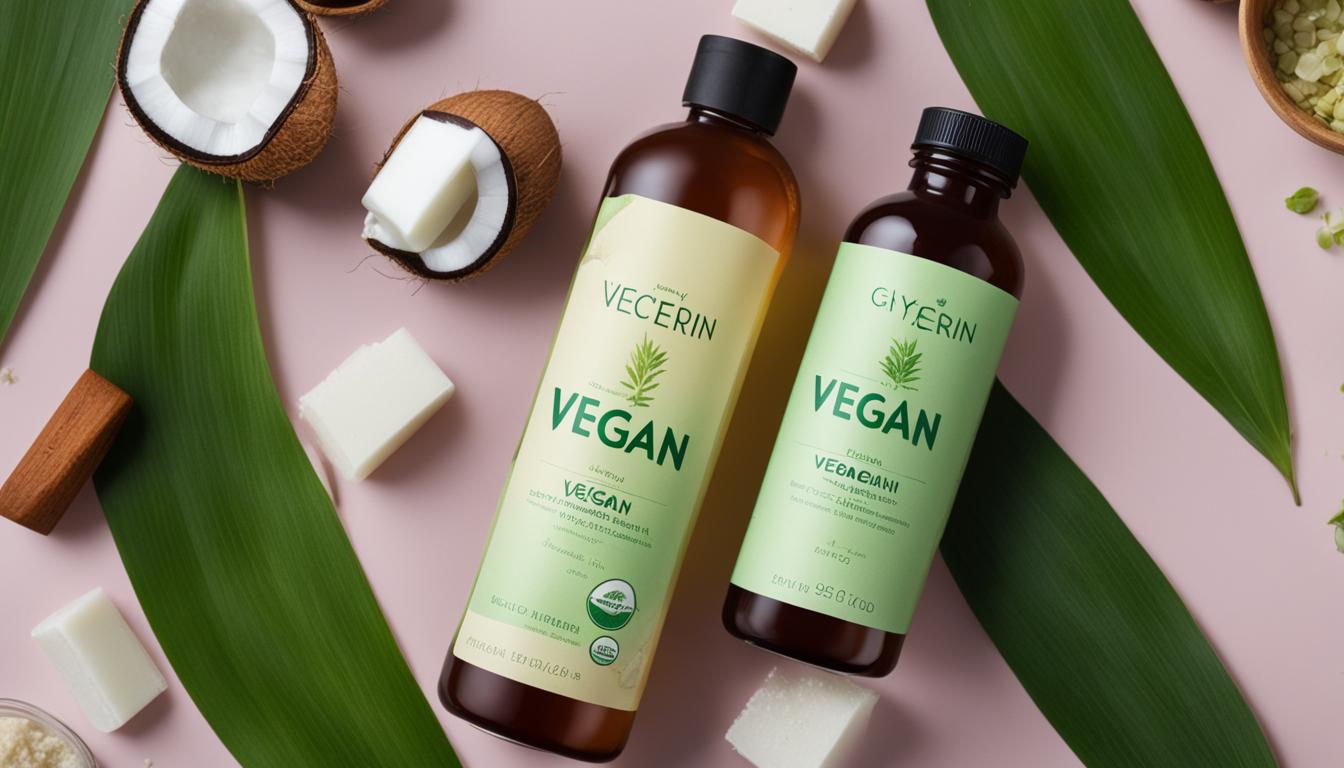Glycerin, also known as glycerol, is a common ingredient in cosmetics and personal care products due to its moisturizing properties. But is it really vegan? The vegan status of Glycerin depends on its source, as it can be derived from both plant and animal sources.
Glycerin obtained from plants like soybeans or palm is considered vegan, while Glycerin derived from animal fats during soap making is non-vegan. This means that Glycerin can be both vegan and non-vegan, depending on its extraction process.
To make informed choices about Glycerin in vegan products, it’s essential to understand its origins and the impact it has on the environment and ethical considerations.
Key Takeaways:
- Glycerin can be derived from both plant and animal sources, making its vegan status dependent on the extraction process.
- Glycerin obtained from plants like soybeans or palm is considered vegan, while Glycerin derived from animal fats is non-vegan.
- The use of animal-derived Glycerin raises environmental and ethical concerns due to the contribution of the livestock industry to greenhouse gas emissions.
- Opting for vegan Glycerin supports a more sustainable and compassionate approach, as it has a lower carbon footprint.
- Producing vegan Glycerin comes with challenges such as limited supply of plant oils and more complex extraction processes.
The Impact of Non-Vegan Glycerin on the Environment and Ethics
Non-vegan glycerin, derived from animal fats, poses significant environmental and ethical concerns. The livestock industry, a major source of animal fats for glycerin production, contributes to greenhouse gas emissions and deforestation. These practices have detrimental effects on our planet, including climate change and habitat destruction. By using non-vegan glycerin in cosmetics and personal care products, we indirectly support these unsustainable practices.
Choosing vegan glycerin can mitigate these environmental and ethical concerns. Plant-based glycerin, derived from sources like soybeans or palm, has a lower carbon footprint and does not contribute to deforestation. By opting for vegan glycerin, we can reduce our impact on the environment and support a more sustainable future.
“The use of animal-derived glycerin in the beauty industry is in conflict with the growing demand for eco-friendly and cruelty-free products.” – Environmental Scientist
Additionally, adopting a vegan glycerin supply chain encourages ethical practices. Animal agriculture often involves inhumane conditions and practices that go against our moral values. By choosing vegan glycerin, we promote a compassionate approach to product manufacturing and support brands that prioritize animal welfare.
| Environmental Impact | Ethical Concerns |
|---|---|
| Contributes to greenhouse gas emissions | Inhumane conditions in animal agriculture |
| Leads to deforestation | Cruelty towards animals |
| Contributes to climate change | Exploitation of natural resources |
It is crucial for consumers to be aware of the impact of non-vegan glycerin and make informed choices. By supporting vegan glycerin products and brands committed to ethical practices, we can contribute to a more sustainable and compassionate beauty industry.
Advancements in Producing Vegan Glycerin and Challenges Faced
Producing vegan Glycerin has seen significant advancements in recent years, driven by the growing demand for plant-based and cruelty-free products. However, this transition is not without its challenges. Let’s explore the advancements in vegan Glycerin production and the obstacles faced by manufacturers in meeting the increasing consumer demand.
Vegan Glycerin Production Advancements
Advancements in technology and research have paved the way for innovative methods of extracting Glycerin from plant sources. Traditional methods using animal fats are being replaced by sustainable alternatives, such as enzymatic hydrolysis of plant oils. This process allows for the separation of Glycerin from triglycerides found in vegetable oils, resulting in a vegan and non-animal-derived product.
Furthermore, the development of new extraction techniques, such as supercritical fluid extraction and membrane separation, has made Glycerin production more efficient and environmentally friendly. These methods minimize the use of harmful chemicals and reduce the overall carbon footprint of the manufacturing process. As a result, vegan Glycerin production is becoming a viable and sustainable option for many cosmetic and personal care brands.
Challenges Faced
Despite the advancements in vegan Glycerin production, there are several challenges that manufacturers must overcome. One of the primary challenges is the limited supply of plant oils used in the extraction process. The demand for plant-based Glycerin has surged in recent years, causing strain on the availability and cost of these raw materials.
Additionally, the extraction process for plant-based Glycerin can be more complex and costly compared to using animal fats. This can pose economic challenges for manufacturers, especially smaller brands with limited resources. However, as the demand for vegan and sustainable products continues to rise, manufacturers are investing in research and technology to find cost-effective solutions.
Furthermore, the lack of standardized regulations and certifications for vegan Glycerin poses a challenge for consumers. While some brands voluntarily label their products as vegan or cruelty-free, others may not provide clear information about the source of their Glycerin. This makes it difficult for consumers to make informed choices and identify genuinely vegan options. However, with the increasing awareness and demand for transparency in the industry, efforts are being made to establish clear certifications and labeling standards.
| Advancements in Vegan Glycerin Production | Challenges Faced |
|---|---|
| Enzymatic hydrolysis of plant oils | Limited supply of plant oils |
| Supercritical fluid extraction | Complex and costly extraction process |
| Membrane separation | Lack of standardized regulations and certifications |
In conclusion, the advancements in vegan Glycerin production have opened up new possibilities for sustainable and cruelty-free alternatives. However, challenges such as limited supply and complex extraction processes still need to be addressed. By supporting brands committed to ethical practices and advocating for clear labeling standards, consumers can contribute to the growth of the vegan Glycerin industry and make more informed choices in their personal care purchases.
Identifying Vegan Glycerin in Products
To ensure the Glycerin in products is vegan, consumers should look for certifications like “Cruelty-Free” or “Vegan” on the packaging. Brands committed to ethical practices often disclose the sources of their ingredients. If unsure, reaching out to the company for clarification is recommended. Checking product labels for the source of Glycerin is essential, as it can be derived from both plant and animal origins.
When reviewing product labels, keep an eye out for specific terms that indicate the source of Glycerin. Look for ingredients like “vegetable Glycerin” or “plant-based Glycerin,” as these are clear indicators that the Glycerin used in the product is derived from plant sources. Conversely, Glycerin sourced from animal fats may be labeled as “animal Glycerin” or “Glycerin derived from animal fats.”
Additionally, some brands may provide detailed information about the sourcing and production of their Glycerin on their websites or product descriptions. This transparency allows consumers to make informed choices based on their personal values and preferences. By supporting brands that prioritize vegan and ethical practices, individuals can contribute to a more compassionate and sustainable world.

Table: Examples of Certifications for Vegan Products
| Certification | Description |
|---|---|
| Cruelty-Free | This certification ensures that the product and its ingredients were not tested on animals. |
| Vegan | A product labeled as vegan is free from any animal-derived ingredients, including Glycerin sourced from animal fats. |
| Leaping Bunny | The Leaping Bunny certification guarantees that no animal testing was conducted at any stage of product development. |
| PETA Certified | The PETA certification indicates that a product is vegan and cruelty-free, providing reassurance to conscious consumers. |
By being mindful of product labels, certifications, and ingredient sourcing, consumers can confidently identify and choose products that align with their vegan values. Whether it’s in skincare, cosmetics, or personal care items, opting for vegan Glycerin allows individuals to support cruelty-free practices and make a positive impact on the environment.
Examples of Vegan Glycerin Products
There are several brands that offer vegan Glycerin products, catering to the growing demand for ethical and sustainable options. Two notable examples are Dr. Bronner’s and The Ordinary, both renowned for their commitment to using plant-based ingredients.
Dr. Bronner’s
Dr. Bronner’s, a well-known organic soap brand, is dedicated to producing vegan and cruelty-free products. They source plant-based Glycerin for their formulations, ensuring that their soaps and other personal care items are free from animal-derived ingredients. Dr. Bronner’s products are widely available and offer consumers a trusted option for vegan Glycerin-based products.
The Ordinary
The Ordinary, a popular skincare brand, also incorporates vegan Glycerin in many of their products. Known for their minimalist approach and effective formulations, The Ordinary offers a range of vegan-friendly products that utilize plant-based Glycerin. From moisturizers to serums, their products can be easily identified as vegan through clear labeling and ingredient transparency.
These examples highlight the availability of vegan Glycerin products in the market, providing consumers with choices that align with their ethical values. By supporting brands like Dr. Bronner’s and The Ordinary, individuals can make informed decisions and contribute to a more sustainable and compassionate world.
| Brand | Product Range | Highlights |
|---|---|---|
| Dr. Bronner’s | Organic soaps, body care | Plant-based Glycerin, cruelty-free |
| The Ordinary | Skincare products | Transparent labeling, vegan-friendly formulations |
Conclusion
In conclusion, when it comes to determining the vegan status of Glycerin, it is crucial to consider its source. Glycerin can be both vegan and non-vegan, depending on whether it is derived from plant-based sources like soybeans or animal fats obtained during soap making. As conscious consumers, we have the power to make informed choices that align with our values and contribute to a more sustainable and compassionate world.
To ensure that the Glycerin in the products we use is vegan, it is essential to check product labels and look for certifications such as “Cruelty-Free” or “Vegan.” Brands committed to ethical practices often disclose the sources of their ingredients, providing transparency to consumers. If any doubts persist, reaching out to the company for clarification can help make an informed decision.
Supporting brands that prioritize vegan and eco-friendly practices is an effective way to make a positive impact. By choosing products that use plant-based Glycerin, we can reduce our carbon footprint and contribute to the preservation of our environment. Making conscious choices related to Glycerin empowers us to be responsible consumers and advocates for a more sustainable future.
In summary, by actively seeking out vegan and eco-friendly options, checking product labels, and supporting brands committed to ethical practices, we can make a difference. Let us embrace the power we have as consumers to shape industries and promote a more compassionate world. Together, we can create a future where conscious choices and informed decisions are the norm.
FAQ
Is glycerin vegan?
The vegan status of glycerin depends on its source. Glycerin derived from plants like soybeans or palm is considered vegan, while glycerin obtained from animal fats during soap making is non-vegan.
What are the environmental and ethical concerns with non-vegan glycerin?
The livestock industry, a major source of animal fats for glycerin production, contributes to greenhouse gas emissions. Choosing non-vegan glycerin raises environmental and ethical concerns associated with animal-based industries.
What are the challenges in producing vegan glycerin?
Producing vegan glycerin can be challenging due to limited plant oil supply and the more complex and costly extraction process compared to using animal fats. However, technological advancements and increased awareness are driving the industry towards more sustainable practices.
How can consumers identify vegan glycerin in products?
Consumers should look for certifications like “Cruelty-Free” or “Vegan” on the product packaging. Brands committed to ethical practices often disclose the sources of their ingredients. Checking product labels is essential as glycerin can be derived from both plant and animal origins.
Can you provide examples of brands that use vegan glycerin?
Dr. Bronner’s, a well-known organic soap brand, sources plant-based glycerin for their formulations. The Ordinary, a skincare brand, also incorporates vegan glycerin in many of their products.

